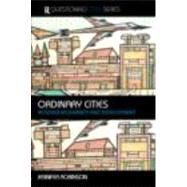- ISBN: 9780415304887 | 0415304881
- Cover: Nonspecific Binding
- Copyright: 1/13/2006
With the urbanization of the world's population proceeding apace and the equally rapid urbanization of poverty, urban theory has an urgent challenge to meet if it is to remain relevant to the majority of cities and their populations most of which are outside the West. Ordinary Citiesestablishes a new framework for thinking about urban development across a longstanding divide in urban scholarship and also in the realm of urban policy, between Western and other kinds of cities, especially those labeled third world. The book will consider the two framing axes of urban modernity and urban development which have been important in dividing the field of urban studies between Western and other cities. Tracking paths across previously separate academic literatures and policy debates, the book attempts to trace the outlines of a cosmopolitan approach to cities. It draws on evidence from Rio, Johannesburg, Lusaka and Kuala Lumpur to ground the theoretical arguments and provide examples of policyapproaches and urban development interventions. Ordinary Citiesargues that if cities are to be imagined in equitable and creative ways, urban theory must overcome these axes of theorization with their Western bias. The resources for theorizing cities need to become at least as cosmopolitan as cities themselves, drawing inspiration from the diverse range of contexts and histories that shape cities everywhere.







